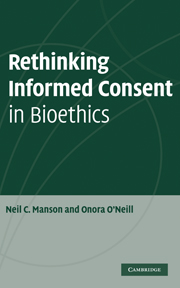Book contents
- Frontmatter
- Contents
- Preface
- Acknowledgements
- 1 Consent: Nuremberg, Helsinki and beyond
- 2 Information and communication: the drift from agency
- 3 Informing and communicating: back to agency
- 4 How to rethink informed consent
- 5 Informational privacy and data protection
- 6 Genetic information and genetic exceptionalism
- 7 Trust, accountability and transparency
- Some conclusions and proposals
- Bibliography
- Institutional sources and documents
- Index
Preface
Published online by Cambridge University Press: 05 June 2012
- Frontmatter
- Contents
- Preface
- Acknowledgements
- 1 Consent: Nuremberg, Helsinki and beyond
- 2 Information and communication: the drift from agency
- 3 Informing and communicating: back to agency
- 4 How to rethink informed consent
- 5 Informational privacy and data protection
- 6 Genetic information and genetic exceptionalism
- 7 Trust, accountability and transparency
- Some conclusions and proposals
- Bibliography
- Institutional sources and documents
- Index
Summary
Informed consent is now widely seen as fundamental to medical and research ethics. This has not always been the case. Informed consent first rose to prominence in biomedical practice with the Nuremberg Code of 1947, which responded to the abusive treatment of human beings by Nazi medical researchers. Consent requirements were subsequently extended from research to clinical ethics, and more recently to procedures regulating the acquisition, possession and use of personal information, including genetic and medical information. Across the last fifty years informed consent requirements have also supposedly been made more rigorous: standards for ‘consent disclosures’ are now more exacting; demands for more explicit and more specific consent are widely endorsed; ever more elaborate consent forms are increasingly devised and required. This huge expansion and elaboration of informed consent requirements is generally seen as indispensable if we are to respect individual autonomy. Informed consent, it is argued, ensures that patients and research subjects can decide autonomously whether to permit or refuse actions that affect them.
Yet current approaches to informed consent have led to many problems. If patients and research subjects consent without reading or understanding informed consent ‘disclosures’ – and it is clear that they do – is their consent inadequate? If consent ‘disclosures’ omit certain information – and it is clear that they do – is consent given on the basis of such disclosures inadequate? Should we forbid medical treatment and research whenever informed consent is defective?
- Type
- Chapter
- Information
- Rethinking Informed Consent in Bioethics , pp. vii - xiPublisher: Cambridge University PressPrint publication year: 2007



